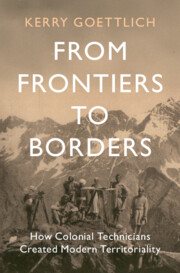Book contents
- From Frontiers to Borders
- LSE International Studies
- From Frontiers to Borders
- Copyright page
- Contents
- Figures
- Tables
- Preface
- 1 The Problem of Colonial Borders
- 2 Modern Territoriality Redefined
- 3 The Settler Colonies
- 4 British India and Beyond
- 5 The Origins of Boundary Studies
- 6 The Paris Peace Conference
- 7 Conclusion
- Bibliography
- Index
1 - The Problem of Colonial Borders
Myth and Reality
Published online by Cambridge University Press: 23 October 2025
- From Frontiers to Borders
- LSE International Studies
- From Frontiers to Borders
- Copyright page
- Contents
- Figures
- Tables
- Preface
- 1 The Problem of Colonial Borders
- 2 Modern Territoriality Redefined
- 3 The Settler Colonies
- 4 British India and Beyond
- 5 The Origins of Boundary Studies
- 6 The Paris Peace Conference
- 7 Conclusion
- Bibliography
- Index
Summary
This introductory chapter begins by considering two general features of the politics of territory in modernity: the expectation that borders should be precisely defined as lines, and the central role of colonial legacies. The book centres on the relation between these two features. Four narratives about the global history of borders that the book seeks to engage with and modify are elaborated: first, colonial-inherited borders are generally remarkable for their vagueness; second, linear borders are originally and most properly a practice of sovereign states or nation-states; third, lines on maps determine politics; and fourth, linear borders were first practiced in Europe, then exported to the rest of the world through colonialism. The chapter outlines the argument and the rest of the book. At its most general level, the argument is that modern borders are distinct not because they express sovereignty but because of certain technical, apolitical practices.
Keywords
Information
- Type
- Chapter
- Information
- From Frontiers to BordersHow Colonial Technicians Created Modern Territoriality, pp. 1 - 25Publisher: Cambridge University PressPrint publication year: 2025
